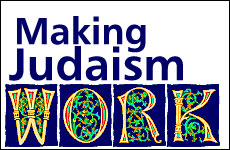 Vampire Weekend's Surprising Jewish Stories
Vampire Weekend's Surprising Jewish Stories


4 min read
Why doesn't Torah observance create a better person automatically?
One of the questions that Jews who are observant of Torah law and ritual constantly face is: "If Torah is all that it is supposed to be, then why are there many Jews who are observant but are otherwise immoral, bad people?"
I always flippantly answer that one should never confuse Judaism with Jews. Torah is pure, pristine, divine and moral beyond description. Jews are human beings, frail of body and will, buffeted by a hostile world and an inimical society. Therefore, there are failures in living up to high ideals. It becomes difficult to control one's passions and desires and the terrible temptations that life offers are omnipresent.
But in my heart I am aware that this is an insufficient, irrelevant answer. It is really only a non sequitur, an avoidance of the basic issue. For why does Torah observance not create a better person automatically? What is the missing ingredient that prevents Torah observance from taking hold of the entire person and elevating him or her? How is the believing, observant Jew to deal with the gap between the promised ideal and the harsh reality that we see around us?
In the midst of the anguish of my recent bereavement mourning the loss of my beloved wife, who was the type of person the Torah had in mind and lived up to the Torah's ideal in her everyday life, I had an insight into this issue, which I am about to share with you.
The Talmud itself states that "Torah, for those who merit it, becomes an elixir of life. Torah, for those who lack such merit, becomes a potion of poison and death."
The Talmud does not specify nor define the merit involved. It is obvious that the Talmud did not treat this merit as a random gift, a chance happening. Rabbi Moshe ben Nachman, the Ramban, following the lead of this idea of the Talmud, states that a person can be Torah observant, operating within the technical rules and rituals of the Torah, and nevertheless be an awful, obscene, despicable person. He therefore challenges Jews to go a step beyond the letter of the law and attempt to infuse true discipline, care for others and holiness into our lives.
His formula is that even those acts of life which are completely permissible to us must carry holiness and dedication with them. But exalted as these ideas are, they still leave us with the gnawing question of why Torah observance does not automatically raise a person to holy heights.
Morals, probity, honesty, modesty, care and tolerance for others, self-worth and self-discipline, all must precede Torah study.
The Gaon of Vilna, Rabbi Eliyahu Kramer, provides us with a glimmer of light in understanding this vexing issue. Moshe, in his final words to the Jewish people, described Torah as the blessing of rain and dew. The Gaon stated that rain and dew fall indiscriminately on the earth. Rain makes flowers and bountiful food crops grow. It also makes weeds, thorns and thistles grow. Whatever seed is in the ground, good or otherwise, is nurtured by rain. He therefore says that for people who train themselves and are trained by their parents and home environment from their earliest youth to be good people -- before they are even old enough to study and observe Torah -- the Torah will then be an elixir of life. The rain will create good crops.
However, for those who do not have that meritorious training as a basis for their entire persona, the Torah will, like rain on fields of thorns and weeds, be a poisonous and negative force in their lives.
We treasure knowledge of Torah. Our schools teach subjects and ideas. But if the basic personality of goodness is not first created within the child, we will be witness continually to the dysfunction of many in the Torah world. The rabbis therefore wisely stated that "good traits and behavior patterns -- derech eretz -- must precede the study of Torah." Morals, probity, honesty, modesty, care and tolerance for others, self-worth and self-discipline, all must precede Torah study. Only then will the beneficial rain of Torah study and ritual observance create the desired Torah person and society. This should be the aim and curriculum of our homes and schools. Knowledge, by itself, can be a dangerous commodity. Planting the right seeds will ensure the beneficial effects of the Torah's rain upon us.
I wish to thank all of you who expressed your support and sympathy to me on the death of my wife. May all of Israel be comforted in our good memories and forthcoming good deeds.
Visit Rabbi Wein's website at www.rabbiwein.com
This article originally appeared in the Jerusalem Post.
